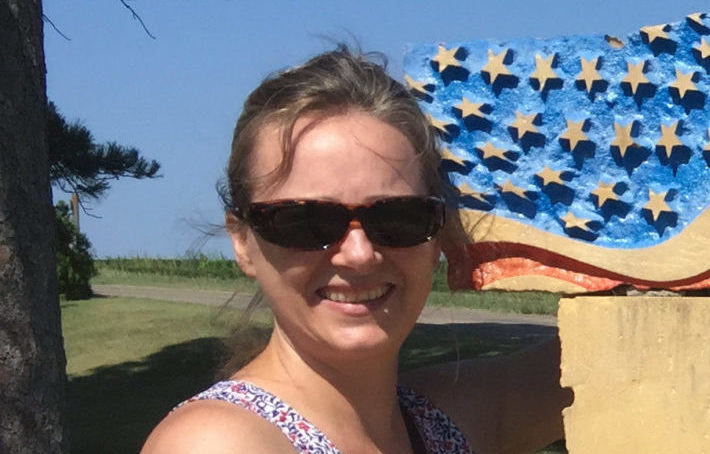Julie Urbanik
Defense Mitigation Consultant and Executive Director of the Coordinates Society

Education: Ph.D. in Geography (Clark University), M.A. in Women’s Studies (University of Arizona), B.A. in History (Randolph-Macon College)
Describe your job. What are some of the most important tasks or duties for which you areresponsible?
As a Legal Consultant, I am an expert witness for defense teams and I assist with the mitigation portion of a case providing exhibits and any needed expert testimony. It is the defense team’s goal during mitigation to provide as holistic of a perspective as possible for a client to assist a judge/jury in coming to the best decision possible. I produce what I call “geonarrative designs” that combine multi-media storytelling with participatory mapping techniques bundled in the context of geographical research connected to particular phenomena (e.g. poverty & crime). My job is to help the defense team make the case that a client’s geography played a mitigating role in their life choices. In essence, I am applying the adage that “place matters.”
As the Executive Director of The Coordinates Society I manage a small, non-profit organization focused on cultivating geographic curiosity. Right now, this is a passion project where we are developing ways to help people connect to the personal, lived experience of geography through workshops.
What attracted you to this industry?
After spending over a decade in academia I found myself being increasingly isolated into the proverbial ivory-tower – teaching classes, publishing, attending conferences, etc. I missed being out in the world! I realize that many geographers are able to find a balance between the academic bubble and the so-called real world, but my particular situation was not conducive to that. I wanted to use my geographic skills in a different way and I decided to leave academia. While a difficult decision to make at the time, I’ve since been able to pursue many other avenues within my love for geography.
How has your education/background in geography prepared you for this position?
As a trained researcher, I would say that my research skills definitely prepared me to step out on my own. Doing the background research and then being able to reach out to specific people for guidance has made all the difference. My training has helped me to think critically and see multiple perspectives, and these skills have helped me navigate the pathways that have been available to me.
What geographic skills and information do you use most often in your work? What general skills and information do you use most often i your work?
The main skill I use across my work is the ability to synthesize. I am an inherently synthetic person – always looking for and seeing connections. Geography, for me, is also inherently synthetic. In both my consulting and non-profit work, my goal is to help others learn how to make connections they would otherwise not have seen.These connections allow them to see themselves or their clients differently, both as individuals and as members of socio-economic-political groups across space.
In my consulting work I focus on educating the legal community about the interplay between identity and place using participatory mapping techniques. In this way, I rely much more on a social/cultural/humanistic geographic framework than a GIS-based or demographically-based (quantitative) perspective.
Communication is central to everything I do. Teaching for so many years certainly helped me learn what works in engaging the public. Your insights into a given topic are only as powerful as your ability to communicate them. Unfortunately, many academics are unable to communicate beyond their conference/journal bubbles; knowing your audience, adjusting your methods, and seeing engagement as a two-way street is essential to bringing geography out into the world.
Are there any skills or information you need for your work that you did not obtain through your academic training? If so, how/where did you obtain them?
On my own I have had to learn non-profit business management, and I am also teaching myself media techniques (e.g., photography, video, editing, audio, web design).
Do you participate in hiring, screening, or training of new employees? If so, what qualities and/or skills do you look for?
My goal for my non-profit is to be able to hire geographers. To date, I have worked with a variety of interns and volunteers that I have been fortunate to have. I look for several qualities in considering both paid and non-paid employees/interns:
- Does this person demonstrate an understanding of my organization and its mission statement?
- How has this person combined their creative and intellectual skills? I look for people interested in their own self-evolution because this means they will contribute to the organization’s growth and not just “phone it in.”
- Does the individual have solid baseline work skills? The right person can be trained and supported to do any kind of work, but they must have a strong foundation to build from. If you cannot organize and self-manage your own life then you are not cut out for the non-profit world.
What advice would you give someone interested in a job like yours?
If you are a geographer looking for non-traditional geographic careers then I think you have to be a real self-starter and risk-taker. You have to be prepared to constantly evolve, pivot, and try things; personally, I believe geographers are optimally positioned to innovate in terms of careers.
What is the occupational outlook for career opportunities in your field/organization, esp. for geographers?
As I have moved out into the world I have found that people and businesses are always looking for “good” partners. I think the greatest opportunity for geographers is to show all manner of employers what the full spectrum of geography is. Most people have no idea and think geography is only GIS or Google maps – but we all know that our field is much more than that – so this goes back to communication. You must help employers see what geography can help them do.